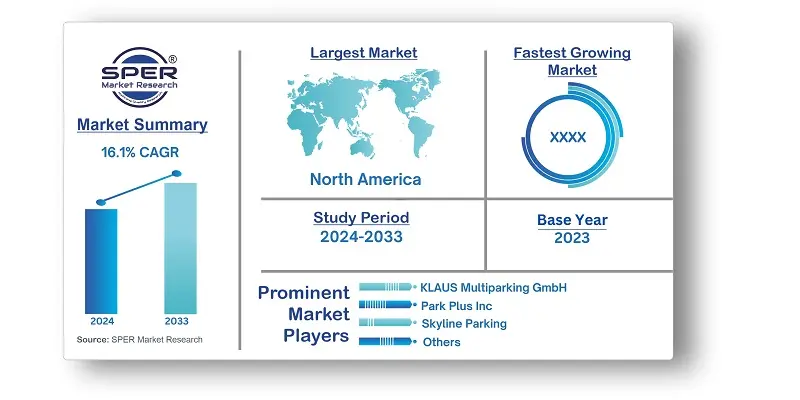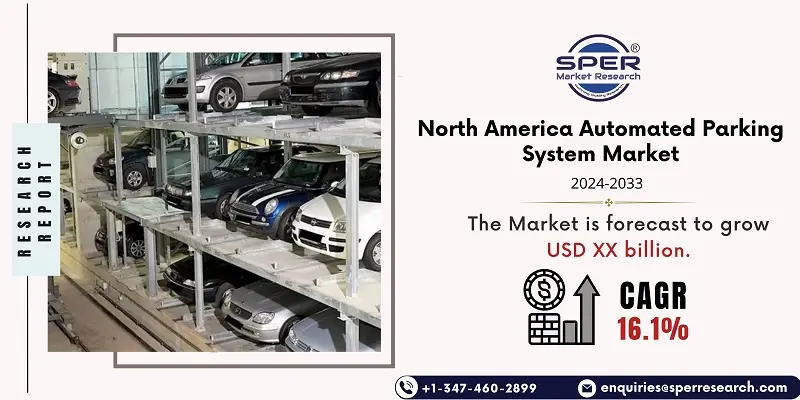
North America Automated Parking System Market Growth, Size, Trends, Share and Future Outlook
North America Automated Parking System Market Size- By Component, By Platform Type, By Automation Level, By End User- Regional Outlook, Competitive Strategies and Segment Forecast to 2033
| Published: Mar-2024 | Report ID: AMIN2499 | Pages: 1 - 153 | Formats*: |
| Category : Automotive & Transportation | |||


| Report Metric | Details |
| Market size available for years | 2020-2033 |
| Base year considered | 2023 |
| Forecast period | 2024-2033 |
| Segments covered | By Component, By Platform Type, By Automation Level, By End Use |
| Regions covered | Canada, Mexico, US, Rest of North America |
| Companies Covered | EITO&GLOBAL INC, KLAUS Multiparking GmbH, Park Plus Inc, Parkmatic, Robotic Parking Systems Inc, Skyline Parking, Unitronics (1989) (Râ€G) Ltd, Westfalia Technologies Inc, WOHR Autoparksysteme GmbH, Others |
- Real Estate Developers
- Municipalities and Urban Planners
- Commercial Property Owners and Managers
- Architects and Designers
- Parking Facility Operators
- Automotive Manufacturers
- Technology Providers
- Investors and Financial Institutions
- Others
| By Component: |
|
| By Platform Type: |
|
| By Automation Level: |
|
| By End Use: |
|
- North America Automated Parking System Market Size (FY’2024-FY’2033)
- Overview of North America Automated Parking System Market
- Segmentation of North America Automated Parking System Market By Component (Hardware, Software)
- Segmentation of North America Automated Parking System Market By Platform Type (Palleted, Non-Palleted)
- Segmentation of North America Automated Parking System Market By Automation Level (Fully Automated, Semi-Automated)
- Segmentation of North America Automated Parking System Market By End Use (Commercial, Residential, Mixed-Use)
- Statistical Snap of North America Automated Parking System Market
- Expansion Analysis of North America Automated Parking System Market
- Problems and Obstacles in North America Automated Parking System Market
- Competitive Landscape in the North America Automated Parking System Market
- Impact of COVID-19 and Demonetization on North America Automated Parking System Market
- Details on Current Investment in North America Automated Parking System Market
- Competitive Analysis of North America Automated Parking System Market
- Prominent Players in the North America Automated Parking System Market
- SWOT Analysis of North America Automated Parking System Market
- North America Automated Parking System Market Future Outlook and Projections (FY’2024-FY’2033)
- Recommendations from Analyst
1.1. Scope of the report1.2. Market segment analysis
2.1. Research data source2.1.1. Secondary Data2.1.2. Primary Data2.1.3. SPER’s internal database2.1.4. Premium insight from KOL’s2.2. Market size estimation2.2.1. Top-down and Bottom-up approach2.3. Data triangulation
4.1. Driver, Restraint, Opportunity and Challenges analysis4.1.1. Drivers4.1.2. Restraints4.1.3. Opportunities4.1.4. Challenges4.2. COVID-19 Impacts of the North America Automated Parking System Market
5.1. SWOT Analysis5.1.1. Strengths5.1.2. Weaknesses5.1.3. Opportunities5.1.4. Threats5.2. PESTEL Analysis5.2.1. Political Landscape5.2.2. Economic Landscape5.2.3. Social Landscape5.2.4. Technological Landscape5.2.5. Environmental Landscape5.2.6. Legal Landscape5.3. PORTER’s Five Forces5.3.1. Bargaining power of suppliers5.3.2. Bargaining power of buyers5.3.3. Threat of Substitute5.3.4. Threat of new entrant5.3.5. Competitive rivalry5.4. Heat Map Analysis
6.1. North America Automated Parking System Market Manufacturing Base Distribution, Sales Area, Product Type6.2. Mergers & Acquisitions, Partnerships, Product Launch, and Collaboration in North America Automated Parking System Market
7.1. North America Automated Parking System Market Value Share and Forecast, By Component, 2024-20337.2. Hardware7.3. Software
8.1. North America Automated Parking System Market Value Share and Forecast, By Platform Type, 2024-20338.2. Palleted8.3. Non-Palleted
9.1. North America Automated Parking System Market Value Share and Forecast, By Automation Level, 2024-20339.2. Fully Automated9.3. Semi-Automated
10.1. North America Automated Parking System Market Value Share and Forecast, By End Use, 2024-203310.2. Commercial10.3. Residential10.4. Mixed-Use
11.1. North America Automated Parking System Market Size and Market Share
12.1. North America Automated Parking System Market Size and Market Share By Component (2020-2026)12.2. North America Automated Parking System Market Size and Market Share By Component (2027-2033)
13.1. North America Automated Parking System Market Size and Market Share By Platform Type (2020-2026)13.2. North America Automated Parking System Market Size and Market Share By Platform Type (2027-2033)
14.1. North America Automated Parking System Market Size and Market Share By Automation Level (2020-2026)14.2. North America Automated Parking System Market Size and Market Share By Automation Level (2027-2033)
15.1. North America Automated Parking System Market Size and Market Share By End Use (2020-2026)15.2. North America Automated Parking System Market Size and Market Share By End Use (2027-2033)
16.1. North America Automated Parking System Market Size and Market Share By Region (2020-2026)16.2. North America Automated Parking System Market Size and Market Share By Region (2027-2033)16.3. Canada16.4. Mexico16.5. US16.6. Rest of North America
17.1. EITO&GLOBAL INC17.1.1. Company details17.1.2. Financial outlook17.1.3. Product summary17.1.4. Recent developments17.2. KLAUS Multiparking GmbH17.2.1. Company details17.2.2. Financial outlook17.2.3. Product summary17.2.4. Recent developments17.3. Park Plus, Inc17.3.1. Company details17.3.2. Financial outlook17.3.3. Product summary17.3.4. Recent developments17.4. Parkmatic17.4.1. Company details17.4.2. Financial outlook17.4.3. Product summary17.4.4. Recent developments17.5. Robotic Parking Systems Inc17.5.1. Company details17.5.2. Financial outlook17.5.3. Product summary17.5.4. Recent developments17.6. Skyline Parking17.6.1. Company details17.6.2. Financial outlook17.6.3. Product summary17.6.4. Recent developments17.7. Unitronics (1989) (Râ€G) Ltd17.7.1. Company details17.7.2. Financial outlook17.7.3. Product summary17.7.4. Recent developments17.8. Westfalia Technologies, Inc17.8.1. Company details17.8.2. Financial outlook17.8.3. Product summary17.8.4. Recent developments17.9. WOHR Autoparksysteme GmbH17.9.1. Company details17.9.2. Financial outlook17.9.3. Product summary17.9.4. Recent developments17.10. Basbug Auto Spare Parts AS17.10.1. Company details17.10.2. Financial outlook17.10.3. Product summary17.10.4. Recent developments17.11. Others
SPER Market Research’s methodology uses great emphasis on primary research to ensure that the market intelligence insights are up to date, reliable and accurate. Primary interviews are done with players involved in each phase of a supply chain to analyze the market forecasting. The secondary research method is used to help you fully understand how the future markets and the spending patterns look likes.
The report is based on in-depth qualitative and quantitative analysis of the Product Market. The quantitative analysis involves the application of various projection and sampling techniques. The qualitative analysis involves primary interviews, surveys, and vendor briefings. The data gathered as a result of these processes are validated through experts opinion. Our research methodology entails an ideal mixture of primary and secondary initiatives.



Frequently Asked Questions About This Report
PLACE AN ORDER
Year End Discount
Sample Report
Pre-Purchase Inquiry
NEED CUSTOMIZATION?
Request CustomizationCALL OR EMAIL US
100% Secure Payment






Related Reports
Our Global Clients
Our data-driven insights have influenced the strategy of 200+ reputed companies across the globe.




















